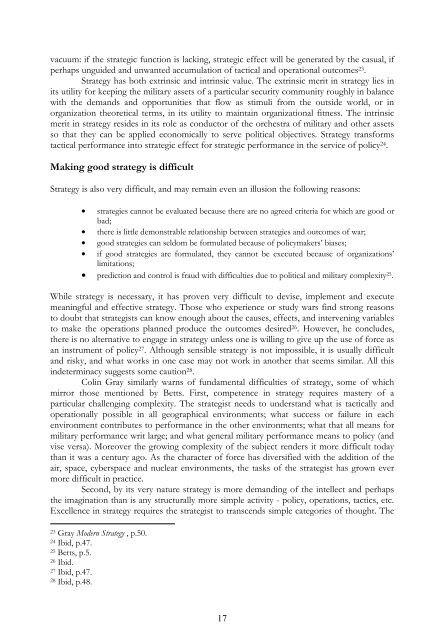Science, Strategy and War The Strategic Theory of ... - Boekje Pienter
Science, Strategy and War The Strategic Theory of ... - Boekje Pienter
Science, Strategy and War The Strategic Theory of ... - Boekje Pienter
You also want an ePaper? Increase the reach of your titles
YUMPU automatically turns print PDFs into web optimized ePapers that Google loves.
vacuum: if the strategic function is lacking, strategic effect will be generated by the casual, ifperhaps unguided <strong>and</strong> unwanted accumulation <strong>of</strong> tactical <strong>and</strong> operational outcomes 23 .<strong>Strategy</strong> has both extrinsic <strong>and</strong> intrinsic value. <strong>The</strong> extrinsic merit in strategy lies inits utility for keeping the military assets <strong>of</strong> a particular security community roughly in balancewith the dem<strong>and</strong>s <strong>and</strong> opportunities that flow as stimuli from the outside world, or inorganization theoretical terms, in its utility to maintain organizational fitness. <strong>The</strong> intrinsicmerit in strategy resides in its role as conductor <strong>of</strong> the orchestra <strong>of</strong> military <strong>and</strong> other assetsso that they can be applied economically to serve political objectives. <strong>Strategy</strong> transformstactical performance into strategic effect for strategic performance in the service <strong>of</strong> policy 24 .Making good strategy is difficult<strong>Strategy</strong> is also very difficult, <strong>and</strong> may remain even an illusion the following reasons:• strategies cannot be evaluated because there are no agreed criteria for which are good orbad;• there is little demonstrable relationship between strategies <strong>and</strong> outcomes <strong>of</strong> war;• good strategies can seldom be formulated because <strong>of</strong> policymakers’ biases;• if good strategies are formulated, they cannot be executed because <strong>of</strong> organizations’limitations;• prediction <strong>and</strong> control is fraud with difficulties due to political <strong>and</strong> military complexity 25 .While strategy is necessary, it has proven very difficult to devise, implement <strong>and</strong> executemeaningful <strong>and</strong> effective strategy. Those who experience or study wars find strong reasonsto doubt that strategists can know enough about the causes, effects, <strong>and</strong> intervening variablesto make the operations planned produce the outcomes desired 26 . However, he concludes,there is no alternative to engage in strategy unless one is willing to give up the use <strong>of</strong> force asan instrument <strong>of</strong> policy 27 . Although sensible strategy is not impossible, it is usually difficult<strong>and</strong> risky, <strong>and</strong> what works in one case may not work in another that seems similar. All thisindeterminacy suggests some caution 28 .Colin Gray similarly warns <strong>of</strong> fundamental difficulties <strong>of</strong> strategy, some <strong>of</strong> whichmirror those mentioned by Betts. First, competence in strategy requires mastery <strong>of</strong> aparticular challenging complexity. <strong>The</strong> strategist needs to underst<strong>and</strong> what is tactically <strong>and</strong>operationally possible in all geographical environments; what success or failure in eachenvironment contributes to performance in the other environments; what that all means formilitary performance writ large; <strong>and</strong> what general military performance means to policy (<strong>and</strong>vise versa). Moreover the growing complexity <strong>of</strong> the subject renders it more difficult todaythan it was a century ago. As the character <strong>of</strong> force has diversified with the addition <strong>of</strong> theair, space, cyberspace <strong>and</strong> nuclear environments, the tasks <strong>of</strong> the strategist has grown evermore difficult in practice.Second, by its very nature strategy is more dem<strong>and</strong>ing <strong>of</strong> the intellect <strong>and</strong> perhapsthe imagination than is any structurally more simple activity - policy, operations, tactics, etc.Excellence in strategy requires the strategist to transcends simple categories <strong>of</strong> thought. <strong>The</strong>23 Gray Modern <strong>Strategy</strong> , p.50.24 Ibid, p.47.25 Betts, p.5.26 Ibid.27 Ibid, p.47.28 Ibid, p.48.17
















